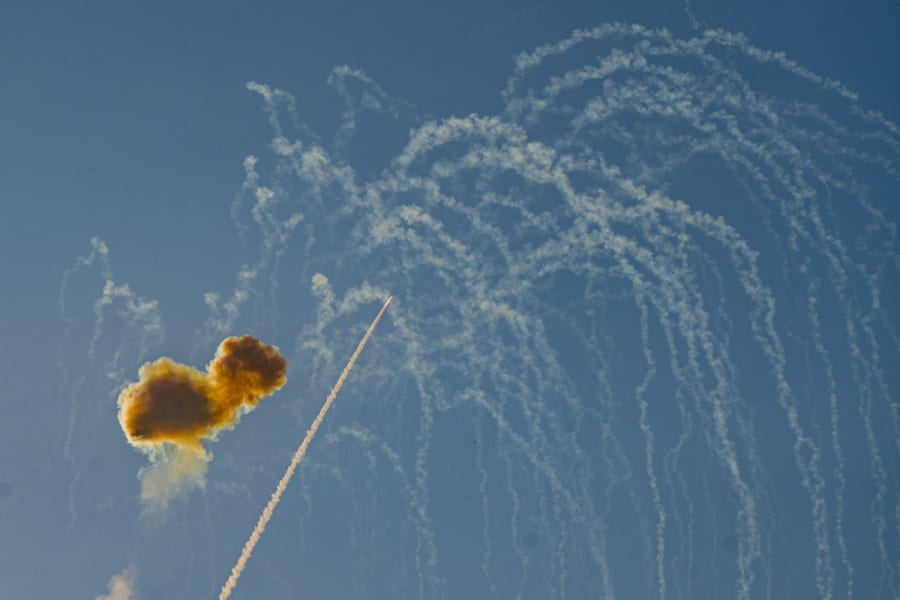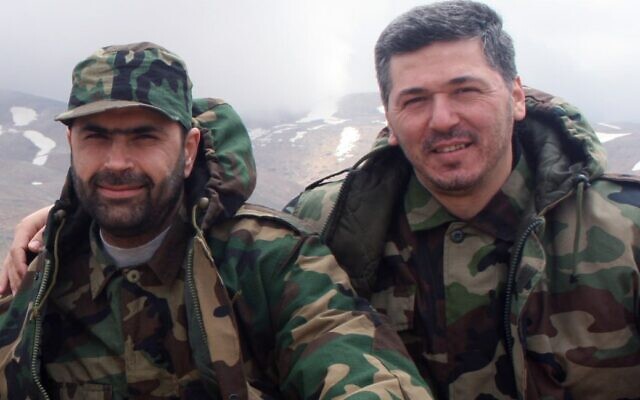215 rockets fired at north after IDF killing of ‘most senior’ Hezbollah officer yet
No injuries in barrages, but Hezbollah vows to ramp up attacks; military says Taleb Abdullah commanded key regional division in south Lebanon, behind numerous attacks on Israel

Hezbollah launched some 215 rockets and several more missiles and drones at northern Israel on Wednesday, in what it said was a response to the killing of a senior commander in the terror group by an Israeli airstrike a night earlier.
The barrages marked the largest attack carried out by Hezbollah during ongoing fighting on the Lebanon border amid the war in the Gaza Strip.
And the terror group vowed to ramp up its attacks in retaliation for Israel’s elimination of top commander Taleb Abdullah. At a funeral procession in Beirut, senior Hezbollah official Hashem Safieddine said the group would increase the intensity, force and quantity of its operations against Israel.

“If the enemy is screaming and moaning about what happened to it in northern Palestine, let him prepare himself to cry and wail,” Safieddine said.
The successive Hezbollah attacks began on Wednesday morning with a barrage of at least 90 rockets fired at several areas in northern Israel, including Tiberias — for the first time amid the war — Safed and Rosh Pina, sending tens of thousands of people to shelters, as Jewish Israelis celebrated the Shavuot holiday.
The Israel Defense Forces said another 70 rockets were then launched at the Mount Meron area, home to a sensitive air traffic control base. Ten more rockets were fired at Kibbutz Zar’it, and an anti-tank guided missile struck a factory of the Plasan armored vehicle manufacturer in Kibbutz Sasa, causing damage.
Later in the morning, a drone launched from Lebanon detonated in an open area near the northern community of Zivon, local authorities said.
Several more rockets were fired in the afternoon hours at the upper and western Galilee areas.
Many of the rockets were shot down by air defenses, the military said.
There were no injuries in the attacks, but several rocket impacts sparked fires in northern Israel.
Some 25 firefighting teams and eight planes were working to extinguish fires near Amiad, in the Ein Zeitim forest, and near Beit Jann, the Fire and Rescue Service said.
Hezbollah took responsibility for the rocket and missile fire, claiming to have targeted several Israeli military sites, including the Meron air traffic control base and the Amiad camp — located some 20 kilometers from the border — as well as the Plasan factory.
Hezbollah said the attacks were a response to Tuesday night’s Israeli strike in southern Lebanon’s Jouaiyya — some 15 kilometers (9 miles) north of the border with Israel — which killed Abdullah and three other operatives.
The IDF on Wednesday confirmed it had carried out the strike.
Abdullah had commanded Hezbollah’s Nasr unit, one of three regional divisions in south Lebanon. The unit is responsible for the region between Mount Dov and the Bint Jbeil area in south Lebanon, and is considered to be the terror group’s first line of attack and defense against Israel.
According to the IDF, Abdullah was the “most senior” Hezbollah commander it had killed amid the ongoing fighting.
Hezbollah referred to Abdullah as a commander in a statement announcing his death. The terror group rarely refers to its senior operatives slain in Israeli strikes as commanders. The only other operative referred to as a commander was Wissam al-Tawil, the deputy head of the terror group’s elite Radwan force, killed by Israel in January. Abdullah was considered to be senior to al-Tawil.
Hezbollah commanders Wissam Tawil (left) and Taleb Abdullah in an undated photo published by Hezbollah on June 11, 2024
Abdullah was behind numerous attacks on northern Israel in the past eight months, mostly against the city of Kiryat Shmona, and other towns and army positions in the Galilee Panhandle, Upper Galilee, and the Golan Heights area, the IDF said.
On Tuesday night, hours before being killed, Abdullah commanded a rocket barrage on the Kiryat Shmona area as Israelis gathered to celebrate Shavuot.
The military published footage of the Jouaiyya strike, as the commander and the three operatives had been gathered in a building for a meeting. All four were killed.
Abdullah was also considered by the IDF to be a “source of knowledge” with many years of experience in the terror group. Abdullah was involved in the 2005 attempted kidnapping in Ghajar, and in the 2006 Lebanon war, was the commander of the Bint Jbeil area, according to the military.
The IDF said it was prepared for the terror group’s response to the strike, and was bracing for additional attacks throughout the day.
Following the rocket barrages, the IDF said it struck four sites belonging to Hezbollah in southern Lebanon’s Yater, used to carry out the attack. Rocket launchers in Hanine and Yaroun, used in the barrages, were also hit, the military said.
Since the day after Hamas’s October 7 attack, Hezbollah-led forces have attacked Israeli communities and military posts along the border on a near-daily basis, with the group saying it is doing so to support Gaza amid the war there.
So far, the skirmishes on the border have resulted in 10 civilian deaths on the Israeli side, as well as the deaths of 15 IDF soldiers and reservists. There have also been several attacks from Syria, without any injuries.
Hezbollah has named 342 members who have been killed by Israel during the ongoing skirmishes, mostly in Lebanon but some also in Syria. In Lebanon, another 62 operatives from other terror groups, a Lebanese soldier, and dozens of civilians have been killed.
Israel has expressed openness to a diplomatic solution to the conflict, but has threatened to go to war against Hezbollah to restore security to the north of Israel, where tens of thousands of civilians are currently displaced.
While Israel’s political echelon has not yet made a decision on launching an offensive in Lebanon, and turning the Gaza Strip into the secondary front, the IDF said it continues to target Hezbollah commanders behind attacks on Israel.

No comments:
Post a Comment